 | | | News about the ocean can be as changeable as the sea itself – calm and soothing, or powerful and dangerous. In this April issue of the RCC Coasts and Ocean Observer, we note continuing threats to the ocean and its coasts and to the creatures and people who live in and around them. As spring will soon give way to summer, the coastal U.S. is preparing for another intense hurricane season and record-breaking ocean temperatures while, at the same time, consciousness about the need to protect the ocean and marine creatures and actions to protect them are growing. 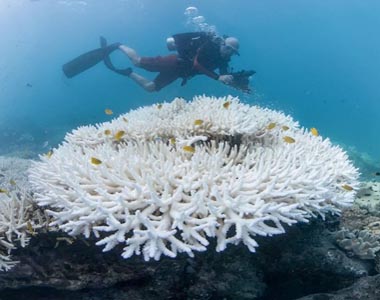 Record ocean warming and acidification are, of course, threatening to ecosystems and people. This month, heatwaves in the ocean have led to mass coral bleaching across the world. Warming temperatures have also caused ocean acidification. Research over the years, discussed by Clayton Aldern in his new book, The Weight of Nature, has found that acidic conditions can cause sensory loss in fish, including their ability to hear and detect odors, and, ultimately, may have similar effects on humans. Record ocean warming and acidification are, of course, threatening to ecosystems and people. This month, heatwaves in the ocean have led to mass coral bleaching across the world. Warming temperatures have also caused ocean acidification. Research over the years, discussed by Clayton Aldern in his new book, The Weight of Nature, has found that acidic conditions can cause sensory loss in fish, including their ability to hear and detect odors, and, ultimately, may have similar effects on humans.
Increasing ocean temperatures have also led to more intense hurricanes, and experts expect that this year will have an above-average number of storms. Researchers at Colorado State University have predicted 23 named storms and 11 hurricanes (compared to the usual 14 named storms and seven hurricanes). This year is also the researchers’ largest prediction for April to date. But as natural marine and coastal ecosystems face greater degradation, ecosystem restoration becomes increasingly important. Texas lost many of its oyster reefs (and harvest) when shells were collected for use in road construction. Now, to help revive oyster reefs in the Gulf of Mexico, Texas A&M University-Corpus Christi has started a program through which restaurants in the area can save shells from the oysters they serve and return them to the ecosystem. Conservation efforts in the Potomac River also have seen recent success in boosting populations of American Shad, fish which travel to the river to spawn in the spring. River cleanups have led to improvements in water quality associated with the return of the shad whose declines Rachel Carson wrote about early in her career. In the U.S. and internationally, the fishing industry has long had negative environmental and social justice implications. In India, the shrimp industry is laden with human rights abuses. For example, women who peel ice-cold shrimp for 10 hours a day often need treatment for frostbite or infections. Many of these instances often go unreported due to companies’ ability to evade auditors. 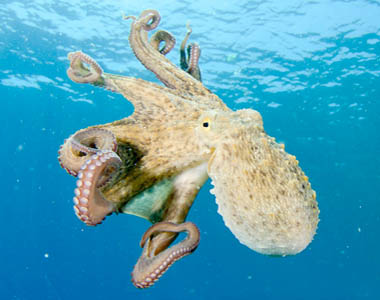 Nevertheless, this month, positive fishing industry news focuses on animal rights. A company in Spain recently proposed factory farming octopi for their meat to reduce harvests of wild populations. However, animal rights advocates are concerned that raising such highly intelligent creatures in captivity would be inhumane and are pushing the Spanish government and European Union to stop approval of the project. Nevertheless, this month, positive fishing industry news focuses on animal rights. A company in Spain recently proposed factory farming octopi for their meat to reduce harvests of wild populations. However, animal rights advocates are concerned that raising such highly intelligent creatures in captivity would be inhumane and are pushing the Spanish government and European Union to stop approval of the project.
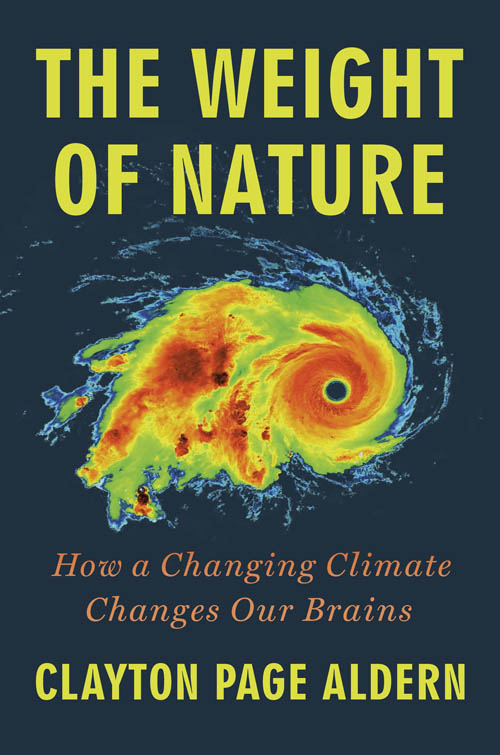 Then, in our “Film” section, look at a preview of Deep Rising, a documentary narrated and executive produced by Jason Momoa about contemporary deep-ocean ecosystems and resource extraction on the seabed. Then, in our “Film” section, look at a preview of Deep Rising, a documentary narrated and executive produced by Jason Momoa about contemporary deep-ocean ecosystems and resource extraction on the seabed.
Finally, be sure to check out Page Aldern’s Weight of Nature: How a Changing Climate Changes Our Brains (Penguin Random House, 2024). As Rachel Carson understood, the octopus, we humans, and the planet are inextricably linked. We had best work to save them all. | | | | | | | |  Emma Brentjens - RCC National Environment Leadership Fellow (Presidential) Emma Brentjens - RCC National Environment Leadership Fellow (Presidential)
Emma Brentjens is the co-lead of the RCC Coasts and Oceans program. She is a Master of Environmental Management student at Duke University studying Ecosystem Science and Conservation and Community-based Environmental Management. | | | | | | Coral Bleaching Crisis Unfolds as Oceans Reach Record Heat Levels Recent ocean heatwaves have triggered the fourth global mass coral bleaching event, devastating coral reefs worldwide. Coral reefs, vital to marine ecosystems, are under severe threat from climate change-induced bleaching. The loss of coral not only impacts biodiversity but also jeopardizes industries reliant on healthy oceans. | | | | | | | | Octopuses Are Highly Intelligent. Should They Be Farmed for Food? A Spanish company is aiming to factory farm octopuses for their meat, contending that it would help conserve the creatures in the wild. But critics argue that caging these highly sensitive mollusks, whose intelligence science is still revealing, would be cruel and inhumane. In the wild, octopods are solitary animals that roam freely in the sea. They spend their days and nights catching prey with their eight arms. | | | | | | | | Coastal Restoration: Recycled Shells and Millions of Larvae — A Recipe for Renewed Oyster Reefs Coastal ecosystems — including oyster reefs, sandy beaches, mangrove forests and seagrass beds — provide important habitat for marine life and food and recreation for people. They also protect shorelines from waves and storms. But these precious systems face serious threats. This series looks at what put them at risk, along with examples of efforts to restore and protect important coastal ecosystems around the world. | | | | | | | | ‘Alarming’ Ocean Temperatures Suggest This Hurricane Season Will Be a Daunting One A key area of the Atlantic Ocean where hurricanes form is already abnormally warm, much warmer than an ideal swimming pool temperature of about 80 degrees and on the cusp of feeling more like warm bathtub water. These conditions were described by Benjamin Kirtman, a professor of atmospheric sciences at the University of Miami, as “unprecedented,” “alarming” and an “out-of-bounds anomaly.” | | | | | | | | Climate Change is Rewiring Fish Brains — and Probably Ours, Too Imagine you are a clown fish. A juvenile clown fish, specifically, in the year 2100. You live near a coral reef. You are orange and white, which doesn’t really matter. What matters is that you have these little ear stones called otoliths in your inner ear, and when sound waves pass through the water and then through your body, these otoliths move and displace tiny hair cells, which trigger electrochemical signals in your auditory nerve. Nemo, you are hearing. | | | | | | | | Nothing Fishy Here. Potomac River Shad Are Making a Comeback! The Potomac River has seen a big improvement in water quality thanks to numerous cleanup efforts. In fact, Potomac Conservancy assessed over 20 ecosystem health indicators and graded the river a “B” in 2023. Back in 2010, the Potomac River scored an abysmal “D.” As the Potomac River’s health improves, so does the population of American Shad, a migratory fish that returns from the Atlantic Ocean to the Potomac each spring to spawn. | | | | | | | | The Shrimp on Your Table Has a Dark History In this week’s Field Report, shining a light on India’s exploited shrimp workers, the spread of avian flu, and the big banks undermining climate goals. A few months ago, along the coast of Andhra Pradesh in eastern India, Josh Farinella drove 40 minutes out of his way to visit workers who peel shrimp for Choice Canning, where he worked as a shrimp factory manager. He didn’t travel to the rural area for any of his job responsibilities; he was there to document injustice. | | | | | | | | | | Deep Rising 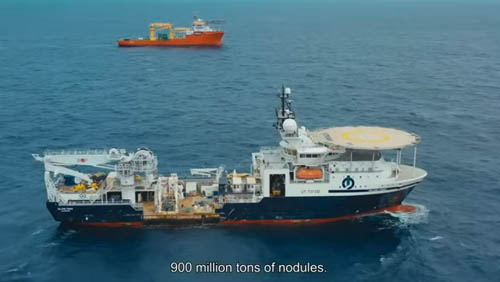 Join us on an epic journey from the deepest depths of our ocean – the most uncharted and inaccessible place on our planet – to the future of green energy, and learn how the two are inextricably linked. Join us on an epic journey from the deepest depths of our ocean – the most uncharted and inaccessible place on our planet – to the future of green energy, and learn how the two are inextricably linked.
Narrated and executive produced by Jason Momoa, and interwoven with awe-inspiring footage of the deep’s most dazzling creatures, Deep Rising illuminates the vital relationship between our ocean’s fragile and mysterious ecosystems, and sustaining all life on Earth. A riveting tale of geopolitical, corporate and scientific intrigue, the film exposes the inner workings of the International Seabed Authority (ISA): a secretive United Nation instrument which oversees nearly half our planet’s surface on the ocean floor. The ISA is empowered to greenlight the massive extraction of metals from the seabed which are deemed essential by some to fulfill demand for the current electric battery technology. As extractive conglomerates pivot investments from oil and gas to deep-ocean mining, Deep Rising asks why we don’t instead choose to develop abundant resources to solve our growing energy demands. Deep Rising reminds us that the seabed is the common heritage of humankind and highlights the urgent need to make the right decision for generations to come. Click here to watch preview | | | | | | ‘Save Our Sand Dunes’ Recalls Fight to Save Jockey’s Ridge 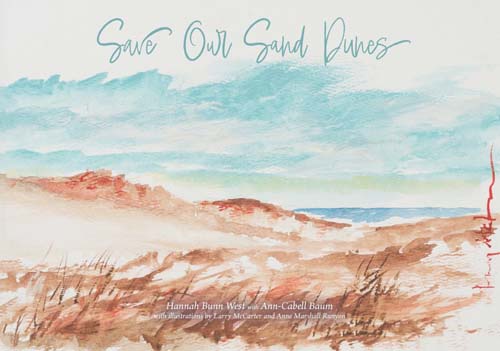 It didn’t go unnoticed by Hannah Bunn West that the children’s book she helped author on the history of Jockey’s Ridge was released while protections for the National Natural Landmark are at risk on the state level. That threat is similar to what prompted the largest sand dune system on the East Coast to be saved and ostensibly permanently protected 50 years ago. It didn’t go unnoticed by Hannah Bunn West that the children’s book she helped author on the history of Jockey’s Ridge was released while protections for the National Natural Landmark are at risk on the state level. That threat is similar to what prompted the largest sand dune system on the East Coast to be saved and ostensibly permanently protected 50 years ago.
On Aug. 15, 1973, siblings Ann-Cabell, Inglis and Gibbs Baum of Kill Devil Hills saw bulldozers at Jockey’s Ridge and ran home to tell their mother, Carolista Baum. In protest, their mother stood in front of that bulldozer, forcing the operator intent on removing sand to abandon his post. Carolista Baum rallied the community to save the dunes, and she co-founded the group People to Preserve Jockey’s Ridge. The group raised money, held petition drives and lobbied state and local officials. The effort paid off. In 1975, Jockey’s Ridge was designated as a North Carolina state park. Ann-Cabell Baum spent her youth in Nags Head across from Jockey’s Ridge. She is now vice chairwoman of the Friends of Jockey’s Ridge State Park. “We were 6, 5 and 3½ the summer of 1973 when we were playing and saw the bulldozer at the back side of the dune,” Ann-Cabell Baum said. Read more | | | | | | The Weight of Nature
How a Changing Climate Changes Our Brains By Clayton Page Aldern  A deeply reported, eye-opening book about climate change, our brains, and the weight of nature on us all. A deeply reported, eye-opening book about climate change, our brains, and the weight of nature on us all.
The march of climate change is stunning and vicious, with rising seas, extreme weather, and oppressive heat blanketing the globe. But its effects on our very brains constitute a public-health crisis that has gone largely unreported. Based on seven years of research, this book by the award-winning journalist and trained neuroscientist Clayton Page Aldern, synthesizes the emerging neuroscience, psychology, and behavioral economics of global warming and brain health. A masterpiece of literary journalism, this book shows readers how a changing environment is changing us today, from the inside out.
Aldern calls it the weight of nature.
Hotter temperatures make it harder to think clearly and problem-solve. They increase the chance of impulsive violence. Immigration judges are more likely to reject asylum applications on hotter days. Umpires, to miss calls. Air pollution, heatwaves, and hurricanes can warp and wear on memory, language, and sensory systems; wildfires seed PTSD. And climate-fueled ecosystem changes extend the reach of brain-disease carriers like mosquitos, brain-eating amoebas, and the bats that brought us the mental fog of long COVID. How we feel about climate change matters deeply; but this is a book about much more than climate anxiety. As Aldern richly details, it is about the profound, direct action of global warming on our brains and behavior—and the most startling portrait yet of unforeseen environmental influences on our minds. From farms in the San Joaquin Valley and public schools across the United States to communities in Norway’s Arctic, the Micronesian islands, and the French Alps, this book is an unprecedented portrait of a global crisis we thought we understood. Read more and purchase | | | | | |  The Rachel Carson Council Depends on Tax-deductible Gifts From Concerned Individuals Like You. Please Help If You Can. The Rachel Carson Council Depends on Tax-deductible Gifts From Concerned Individuals Like You. Please Help If You Can. | | | | | | | |  Sign Up Here to Receive the RCC E-News and Other RCC Newsletters, Information and Alerts. Sign Up Here to Receive the RCC E-News and Other RCC Newsletters, Information and Alerts. | | | | | | | | | | | |